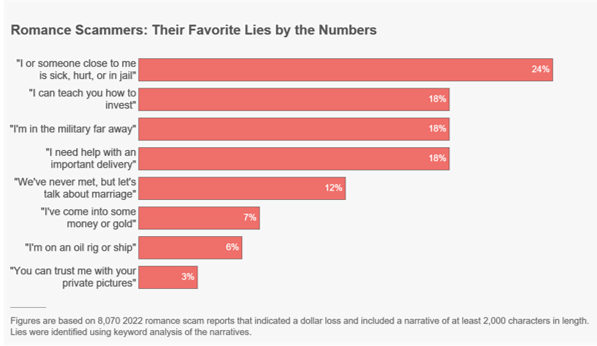“Rah, rah-ah-ah-ah. Roma, roma-ma.
Gaga, ooh-la-la. Want your bad romance.”
This Valentine’s Day if you find yourself gaga over an online love, the Federal Trade Commission – yes, the FTC – has advice on ways to tell if you could be caught in a “Bad Romance.”
According to a new Consumer Protection Data Spotlight, in 2022 the Consumer Sentinel Network received nearly 70,000 reports of romance scams, with reported financial losses hitting a staggering $1.3 billion.
Many people who report losing money say the contact started on a website or app. But the more common approach – according to 40% of reports – was through a social media platform, often as an unexpected message. You know, one of those “Hi, there,” “Loved your post,” or “You’re cute!” comments from an attractive stranger.
From there, the romance scammer may suggest a move to WhatsApp, Google Chat, Telegram, etc. That’s where they may turn to a favorite trick: subtly teasing out their target’s likes and dislikes and then mirroring them back to create what looks like an instant connection. Are you a football fan? They are, too! Is poetry your thing? OMG, let me count the ways! But when it comes time to meet in real life, they have a “Million Reasons” to avoid a face-to-face. According to the Data Spotlight, their excuses are often baked into their bogus identities – for example, they live half-way around the globe and can’t leave the country.
One thing romance scammers have in common is knack for lying with – you knew this was coming – a “Poker Face.” The Data Spotlight lists favorite “Love Game” lies reportedly told by romance scammers:

So what’s in it for them? Money. Once they’ve forged a connection, the sob stories start. They’ll tell you they’re hurt, sick, or in jail and all they need to ignite the romance IRL is cash to cover hospital bills, bail, or some other calamity. Or they may turn the tables by offering to do you a “favor.” For example, they may claim to be a big-time crypto investor who can share inside know-how with you. Or they say they want to send you an expensive gift. You just need to send someone “customs fees” up front.
The way romance scammers ask for money is another important piece of the story. According to the Data Spotlight, cryptocurrency and bank wires account for more than 60% of reported romance scam losses in 2022. Gift cards were right up there, with 24% of people who reported losing money saying that was the method.
But there’s an even seamier way romance scammers are creating a pay day for themselves – and it’s called sextortion. According to reports, scammers convince their target to share explicit photos and then threaten to share the pics with social media contacts unless the person pays up. Sextortion reports have increased more than eightfold since 2019, with people between 18 and 29 reporting it over six times more often than the 30+ demographic. About 58% of 2022 sextortion reports identified social media as the contact method, with Instagram and Snapchat topping the list.
With apologies to Lady Gaga, the FTC has advice on spotting a romance scam.
“Got my flash on, it’s true. Need that picture of you.” If someone you’re talking to online has a profile picture, try a reverse image search. If the details don’t match up, they’re up to no good. Also, it goes without saying, but we’ll say it anyway: Don’t send explicit photos to an online love. Period. End of sentence. End of relationship.
“You know I appreciate the finer things.” The minute your online romance turns to finance, call it quits. Nobody legit will ever ask you to help – or insist you invest – by sending crypto, wiring money, or giving numbers on a gift card. If the talk turns to “Money Honey,” that’s your cue to scoot.
“It wasn’t love. It was a perfect illusion.” The beginning of a romance can make anyone go a bit, well, gaga. Tell people you trust if you’re getting interested in someone online and pay attention to any concerns they raise. And do the same for your friends. If you suspect they’re starry-eyed over a scammer, the FTC has resources you can share.
What can you do to help shut down romance scams? Report suspicious profiles or messages to the dating app or social media platform. Then tell the FTC at ReportFraud.ftc.gov. And if someone is trying to extort you, contact the FBI.
Resource: Federal Trade Commission



